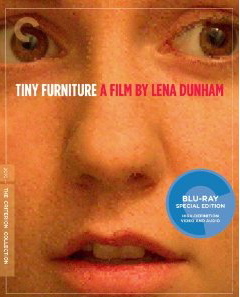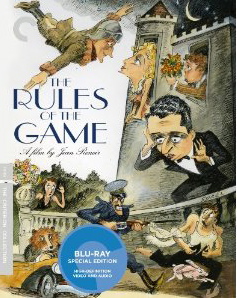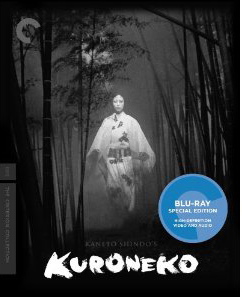Meeting The Criterion: TINY FURNITURE, THE RULES OF THE GAME, KURONEKO

Before I tackle my second set of Criterion releases I thought it might be good to talk a little bit about where I'm coming from regarding arthouse cinema. I consider this an everyman column or, to put it in another way, Criterion from an unschooled point-of-view. That isn't a cop-out. I do my best to do justice to my experience of these films as I write and take advantage of the opportunity they provide me to grow in my ability to appreciate all film has to offer. But, as a film writer, especially as time has gone by, I've increasingly had to ask myself if this is what I should be doing and if so, why. Who needs another voice out there in cyberspace pontificating about film? Especially the great films, the truly noteworthy films.
Part of this self-questioning has to do, no doubt, with getting older and confronting the fact that I'm certainly no world class scholar, no film academician, no film historian. Hell, I'm not even a particularly good speller. So what keeps me going?
The answer proved inescapable. The discovery that, for myself, film, and thinking writing and talking about film, are central to my passion, which is connecting others to film and hopefully through film to a deeper part of themselves that needs what film has to offer. For me, film is an extension, a lifeline, inviting all of us to the great conversation that humans have with each other and with the truth and the lies that make up our sadly broken world. Feel like talking? There's nothing film hasn't covered, no aspect of the human condition it has failed to touch on. How deep do you want or need to go?
Talk with me. Not about some arcane theory of politic or social science or film trivia that traps us both in the shallows or, worse, in the abstract but about what moves you, what provokes you, what keeps you coming back to the darkened screening room to be poked and prodded and stroked and caressed and slapped and screamed at. Meet me in the place between, the strange hinterland twixt audiences and the floating phantoms. Experience the terror, the wonder, the joy, the sorrow, with me and then we can talk. If you are human, you are more than qualified to start talking anytime- especially about the great films.
TINY FURNITURE

A quick peak at Rotten Tomatoes is interesting here. Roughly three-quarters of critics dug this minor gem while barely half the movie going public did. Why is that? I place myself squarely with the critics on this one. Lena Dunham has not only made a brave film, but a funny, often insightful, and almost always true to the moment, one. The fact is, I suspect, most of the audience would like to pretend they are nothing like Denham's main character or that if they ever have been, they have no interest in revisiting what must have been a very scary, painful, humbling time in their lives. But this is precisely what makes Denham such a vital filmmaker and what makes this film's inclusion in the Criterion canon stomachable; it nails a rough-hewn authenticity in spite of a plot that seems too loose and a premise that has been done to death.
Denham plays Aura, a young woman on a predictable narrative trajectory. Recently graduated, fresh off a bad breakup, and not sure what to do next, she returns home to her self absorbed artist mother, Siri, (played by Denham's real-life artist mom Laurie Simmons), a recently uncloseted and rather catty sister Nadine, (played by her real life sister Grace Denham) only to discover you can go home again but it will suck just as much as it did before you left.
Tiny Furniture has been marked by many as a mumblecore masterpiece, mumblecore being a brand of cinema that is typically low-budget, and tends to use amateur actors or extremely naturalistic acting styles and dialogue. Other defining characteristics would also seem to place the film squarely in the mumblecore camp. The film concerns a white, post-college twenty something, trying to build identity midst the malaise of her middle class background. She is a creature of angst discovering that the world does not place her at it's center which forms the central idea of the film.
But beyond the raw stylings that the label mumblecore suggests, Denham proves far more interested in the artifice of cinema than Kevin Smith or Joe Swanberg or the Duplass' in the way she uses framing and composition. While all of the above have produced good to great work, Denham shows a skill far, far beyond her years here and while Tiny Furniture bears the marks of a young loosely focussed talent I can only imagine what might lie down the road for someone who handles characters and camera with such obvious care. Her heart comes thru loud and clear.
I remember hearing youtube cited in a lyric recently by a local band. It was a wistful reference about connecting with loved ones. The assumption was that people have successfully adapted to social media as a way of enjoying human community. I love that. Denham started out making youtube videos and it shows here. Her work is all about needing to talk, reach out, understand, feel. On the surface Aura's inner life seems as bland and uninteresting as ours. But by the time Aura is shouting at her mother and sister we feel not only her outrage but her embarrassment at having made a spectacle of herself in front of two people that know her well enough not to take her that seriously. The relief when her mother reaches out to comfort her is palpable.
The transfer looks great offering high detail and warm colors without sacrificing the digital look and feel. In short, seen on my plasma screen and my LCD, this looks very close to the original theatrical presentation. Sound is crisp, clear and, most important in a largely dialogue driven film, not distracting.
The extras are solid. You get a half hour interview/conversation between Nora Ephron and Denham, and a great featurette in which Paul Schrader talks about his admiration for Denham and her work. Also included are four early short films from Denham and her 59 minute feature debut Creative Nonfiction , which was made when she was in college. A booklet essay on Denham and her work,by film scholar Phillip Loate, is also included.
THE RULES OF THE GAME

Well it took me long enough, but now that I've finally seen Rules of the Game (1939), I can hold my head a tad higher. More importantly, I can get on with exploring more of Jean Renoir's oeuvre. At once reminiscent of the wildly plotted screwball Hollywood comedies of the thirties Rules of the Game manages something startlingly complex not only in terms of plotting but in ideas and proved to me at any rate that it is truly one of the great films. If Bringing Up Baby (1938)and The Philadelphia Story (1940) conjure social commentary out of their embrace of the glamorous eccentrics that populate them then Rules of the Game is like a philosophical treatise decimating the very idea of classism via, among other things, life and death narrative stakes. On the surface it would seem a simple satire but it is far darker than anything associated with the period it comes from.
Andre, a famous aviator, lands after a record setting flight only to discover that Christine, his much loved mistress, has failed to meet him. Unbeknownst to him, this is because she is determined to break off the affair. Meanwhile her aristocrat husband is seeking to break off his own affair. Into this complicated series of entangled hurt feelings and inflamed passions comes Octave. Octave (played by Renoir himself) is a dancing bear of a man, hopelessly romantic, and friend to all. Helping to secure Andre an invitation to Christine's mansion for a weekend hunting party Octave continues to try and keep the peace between all parties only to make things even worse. As the guests gather and the guns get passed around it becomes apparent to all but a well meaning fool that tragedy is inevitable. In the middle of this the servants deal with their own contre temps thoroughly upending the social conventions of their genteel masters.
In marking Rules of the Game as a decimation of the idea of classism I in no way wish to intimate that the film is mean-spirited. It's humor derives, certainly, from comeuppance but it is a comeuppance richly deserved by all, rich and poor, over flaws that everyone shares. As Octave shares, "The awful thing about life is this: Everybody has their reasons." Was there ever a bigger comic tragedy than to realize no one of us is better than anyone else? True Renoir chooses common,harmless enough foils for his point but he manages to wring epic tragedy out them. In any event, in true human fashion Rules of the Game was excoriated by audiences and critics upon release and was a major financial failure for Renoir.
The extras here are voluminous and, if I am correct, all carryovers from the previous excellent Criterion DVD release. The real question is whether to upgrade and I would say, absolutely yes. This is a timeless classic, the sort of film that can be encountered over and over again, and the sound and picture here are the result of a huge restoration effort. Almost lost to history during the ravages of World War II Rules of the Game isn't likely to look or sound better in the future than it does here.
KURONEKO

There was no way I was going to miss this. Director Kaneto Shindô had previously blown my mind with Onibaba (1964),which told an eerie, unsettling story of murder, love and madness in time of war. It was lush atmospheric stuff on a par with anything I had experienced from Bava or Lewton. Knowing ahead of time that Kureneko would explore similar themes had me aching to get my hands it.
The story concerns two woman, a mother and daughter. Civil War has called the daughter's samurai husband away, leaving the pair to fend for themselves as best they can. As the war is ending, while hoping for word of his safe return, they are set upon by a savage band of samurai, raped and murdered, their bodies and the farm burned. The husband returns too late. Unable to avenge them he moves on becoming an important government official but haunted by the horrible tragedy. Meanwhile the women's spirits have begun stalking and killing wayward samurai causing such consternation that he is called to solve the mystery of the murders and execute the perpetrators, in essence, being sent, unknowingly, to kill his own family. What results is a tense triangle of motivations the need for justice, the lust for revenge and the hope of love.
Kuroneko just didn't work quite as well for me as it's predecessor. It's a fine film offering a stylized series of visuals that clearly place it high in the ranks Asian horror. But it also seems unduly mannered, even stilted, as if Kaneto Shindo is determined to stretch a short out into feature length. There's no doubt the initial series of murders seems repetitive and a talkiness pervades. But even given these flaws Kuroneko is never less than gorgeous to look at, confident in it's ability to evoke an eerie fairytale and, occasionally, the raw power of gruesome campfire story. It's easy, as Maitland McDonagh points out in her excellent introductory essay in the BluRay booklet, to see the influence this film had on filmmakers who went on to produce some of the best of the mid-nineties and early millennial Asian horror. Yet Kuroneko will thoroughly confound anyone looking for just another Asian horror film. Abstractions abound demanding viewers to look beyond the images presented into the heart of the film's characters. What would you do if you suddenly discovered your wife and mother-in-law had returned from the grave as vengeful demons? What would it feel like to be caught between a desire for justice and a desire to simply be reunited with ones you love? If Onibaba is a masterpiece then Kuroneko is a substantial footnote offering insight into the director's creative process and an interesting treatment of the themes that he continually explored in his work.
Criterion has rendered the film beautifully offering an outstanding 4K transfer off a fresh 35mm print of the original negative. With the amount of black onscreen it helps the film immensely as do the new and improved english subtitles. Other extras include a video interview with Kaneto Shindo, an interview with critic Tadao Sato and a booklet featuring, as mentioned, a great essay by film critic Maitland McDonagh.







